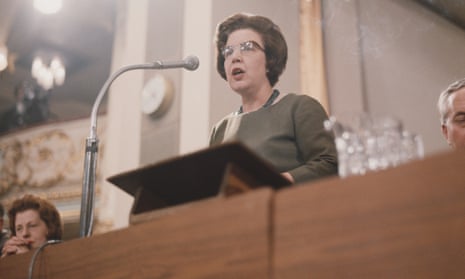Politicians in opposition writing political biographies is a distinct sub-genre: Roy Jenkins on Asquith, William Hague on Pitt the Younger, Boris Johnson (in opposition as Tory mayor of London to everyone’s interests except his own) on Churchill, and now the former Labour frontbencher Rachel Reeves on an almost forgotten postwar Labour politician, Alice Bacon.
Her subject fully deserves to be rescued from posterity’s condescension. Brought up in a politically active Yorkshire mining family, she was elected a Leeds MP in the Attlee landslide of 1945 and, during her quarter-century in the Commons, rose to become an influential minister, though never in the cabinet. On her death in 1993, she was recalled by a Yorkshire paper as a woman who “was able to deal with world leaders and Leeds pensioners in the same honest, forthright manner”.
The great strength of Reeves’s biography is how she, painstakingly and at odd moments, movingly brings out what really mattered to Bacon throughout her career: local issues, the Labour party and education.
MPs are now expected to attend to their constituency duties, but two generations ago that was far from invariably the case. Churchill’s son-in-law, Duncan Sandys, was seldom sighted in Streatham and Norwood more than once a year. By contrast, Bacon could hardly have been more assiduous, with Reeves (herself a Leeds MP) noting that “her local surgeries are fondly remembered even today”. Housing, education, industrial injury, health, pollution – those, emphasises Reeves, were the paramount concerns of a largely working-class city in an era of more or less full employment but real poverty and harshness of environment. Bacon, who had grown up with those concerns, stayed close to her people.
She was also unfailingly loyal to her party, not least when in the early 1980s, as someone on Labour’s right and instinctively out of sympathy with Michael Foot, Tony Benn et al, she might have followed the example of Shirley Williams and gone over to the SDP. The great political – and perhaps personal – tragedy of her life was the death in 1963 of Hugh Gaitskell, her fellow Leeds MP and undoubtedly the greatest prime minister Labour never had.
His successor as leader, Harold Wilson, came from the Bevanite, non-Gaitskellite wing of the party, but Bacon unhesitatingly pledged and gave her loyalty. It was an understandable source of pride that she was a female MP at a time when there were so few, but what truly motivated her was that Labour should be in power and thus making a difference.
Which above all meant education: not only provision – a teacher in her young days, Bacon fought doughtily and effectively for modern facilities and smaller classroom sizes – but also structures. By the 1950s, she was campaigning vigorously against the injustices and inefficiencies of the 11-plus system, while during the 60s she was second only to Anthony Crosland as the key minister pushing ahead with comprehensivisation, a push that Margaret Thatcher, in the early 70s, found herself unable to turn back. It was Bacon’s most significant legacy.
All this and more is fairly and scrupulously related by Reeves. But perhaps befitting an economist by training, she is not a natural biographer. Too often, the focus is internalist, with the reader lost in thickets of institutional machinery; too many of the long quotations are worthily dull, Bacon herself too seldom comes off the page and a tighter copy edit would have been helpful in this valuable study.
The entire subtext of Alice in Westminster is the light it sheds on Labour’s current dire plight. Two powerful lessons come through. The first is the sacrosanct importance of party unity, an importance transcending the party’s periodic lurches to the right or left. Reeves herself seems to be one of many Labour backbenchers now playing the long game, waiting patiently for the current leftwards lurch to run its natural course. Given our stultifying first-past-the-post electoral system, there is probably no realistic alternative.
The other lesson is the overriding need to concentrate in a practical way on the issues that most directly affect people’s lives. Reeves tactfully declines to invoke “Islington dinner parties” as the alternative and undesirable approach, though that is her critical thrust. In an obvious sense, she is right – but only up to a point. Twice in her career, Bacon passed up the chance to do something about private schools, on the grounds that Eton and the rest were too remote from her Leeds constituents. Those schools would subsequently become ever more powerful – and ever more damaging to the educational outcomes that Bacon had devoted her life to trying to achieve. In short, the big picture also matters.

Comments (…)
Sign in or create your Guardian account to join the discussion